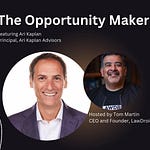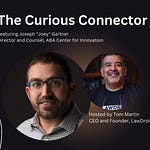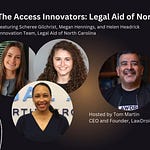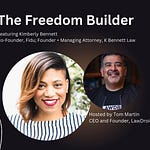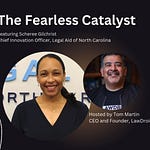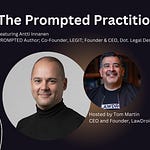Hey there Legal Rebels! 👋 I'm excited to share with you the 29th episode of the 2025 season of the LawDroid Manifesto podcast, where I will be continuing to interview key legal innovators to learn how they do what they do. I think you're going to enjoy this one!
If you want to understand how to navigate the entrepreneurial journey from law to legal tech to AI innovation, and see how someone transforms personal frustrations into breakthrough products, you need to listen to this episode. Thomas is at the forefront of AI-powered productivity tools and brings a uniquely thoughtful perspective to building technology that enhances rather than replaces human creativity.
Transforming Ideas into Innovation Through AI-Powered Voice Notes
Join me as I interview Thomas Officer, co-founder and product lead of Echo, an AI voice notes application that's revolutionizing how we capture and connect our thoughts.
In this insightful podcast episode, Thomas shares his remarkable journey from studying law at the University of Edinburgh to co-founding Community Lawyer (later After Pattern), which was acquired by NetDocuments. He dives deep into his transition from legal tech to consumer AI products, demonstrating how personal frustrations can become the foundation for innovative solutions. Thomas also reveals the philosophy behind Echo's design, creating technology that amplifies human thinking rather than replacing it.
His stories and insights underscore the importance of maintaining momentum in entrepreneurship, the value of user research, and the critical balance between AI assistance and human creativity. This episode is a must-watch for anyone interested in the intersection of legal practice, entrepreneurship, and AI innovation, offering valuable perspectives on building products that truly serve human needs.
The Skinny
Thomas Officer, co-founder and product lead of Echo, shares his unconventional journey from studying law at the 425-year-old University of Edinburgh to building legal tech platforms and ultimately creating an AI-powered voice notes app. With experience spanning securities law, tech accelerators, and legal tech entrepreneurship, Thomas demonstrates how diverse experiences can converge into innovative solutions. Through his work at CrowdCheck, Blue Ridge Labs, and Community Lawyer/After Pattern, he developed a deep understanding of user research and the importance of solving real problems. His transition to Echo represents a shift from legal tech to consumer AI, driven by the belief that AI should enhance human creativity rather than replace it. Thomas emphasizes the critical balance between momentum in entrepreneurship and thoughtful product development, showing how personal frustrations with note-taking led to a breakthrough application that connects ideas and helps users develop their thoughts into meaningful content.
Key Takeaways:
Thomas's journey from law student to legal tech entrepreneur demonstrates the value of following curiosity and maintaining momentum in career transitions
His experience at Blue Ridge Labs taught him the importance of user research and grounding decisions in real user needs rather than assumptions
The transition from Community Lawyer to After Pattern shows how pivoting based on market feedback can lead to successful outcomes and acquisition
Echo represents a philosophy of AI as assistant rather than replacement, focusing on enhancing human creativity and thought development
The importance of maintaining momentum in startups, "startups are like sharks, you die when you stop moving," drives continuous learning and adaptation
User research and direct customer feedback are essential for product development, as demonstrated through his work with low-income New Yorkers at Blue Ridge Labs
The concept of "grokking," deep empathetic understanding between people, drives Thomas's commitment to helping others through technology
Building products that connect ideas (like the Zettelkasten method from the 1930s) can be enhanced by modern AI without losing the human element
Notable Quotes:
"Her name was Donna Strange. And that just, I don't know, I found that compelling. And so I did engage. Maybe it's like a clever trick like a teacher does, but it worked. It was very effective on me." - Thomas Officer (07:21-07:37)
"We wanted to bring a lot of the core beliefs, if you will, of the software development world to the legal world. And a core belief in the software development world is open source. You're not diminishing my work by taking it and extending it. You're adding to the overall collective of work." - Thomas Officer (02:43-03:02)
"There's this old saying, I think Paul Graham said it, the founder of Y Combinator, that startups are like sharks, you die when you stop moving. I don't know if that's how sharks actually work, but the sentiment I agree with, you just gotta keep doing things." - Thomas Officer (40:11-40:24)
"It's from the book Stranger in a Strange Land, where this character Michael grows up on Mars with the Martians who don't have language as we know it, but they have a method of communication that allows them to grok, just like a deep, empathetic understanding of another person." - Thomas Officer (30:07-30:23)
"Is there a world where the AI isn't writing for you, it's just taking your notes... And helping you shape them into some writing. So the output is yours. You just had this really helpful assistant who took all your notes and combined them into an output." - Thomas Officer (44:33-44:50)
"It's the time of the idea person. Actually implementing the idea is going to get easier and easier. We'll soon get to a place where really the hard part is, all right, I have this super helpful assistant. It tells me it can do anything. So what do I want it to do?" - Thomas Officer (48:39-48:56)
"There's no better feeling than a small team all getting in sync and rowing in the same direction. That's deeply, deeply satisfying." - Thomas Officer (49:59-50:09)
Clips
The Sacred Feeling of Truly Connecting
Re-Thinking AI Slop, Humanizing AI Writing
The Challenges of "Community Lawyer”
How AI Unlocks Authentic Idea Development
Thomas's journey reflects the evolution of legal technology and the broader shift toward AI-enhanced productivity tools. His path from studying ancient legal systems in Edinburgh's historic lecture halls to building cutting-edge AI applications demonstrates how diverse experiences can converge into innovative solutions. What makes his story particularly compelling is his consistent focus on solving real human problems, whether helping people find legal representation through Community Lawyer or helping knowledge workers organize their thoughts through Echo.
The transition from legal tech to consumer AI might seem unexpected, but Thomas's approach remains consistent: build tools that amplify human capabilities rather than replace them. His work on Echo embodies this philosophy, creating technology that helps users develop their own ideas rather than generating artificial content. This human-centered approach to AI development offers a refreshing perspective in an era where many worry about AI replacing human creativity.
Closing Thoughts
As someone who's been in the legal tech space for years, I find Thomas's journey particularly inspiring because it demonstrates the power of following curiosity while maintaining practical focus. His transition from law to legal tech to AI innovation wasn't random, each step built on previous experiences and insights about human needs and technological possibilities.
What excites me most about Thomas's work on Echo is how it addresses a fundamental challenge we all face: how to harness AI as a thinking partner rather than a replacement for thinking. The application's focus on connecting ideas and helping users develop their own thoughts represents exactly the kind of human-AI collaboration we need more of in our industry.
For our Legal Rebels community, Thomas's story offers valuable lessons about entrepreneurship, user research, and the importance of building products that truly serve human needs. His emphasis on momentum—keeping moving and learning—combined with deep user research creates a powerful framework for innovation. As AI continues to reshape our profession, those who can balance technological capability with human-centered design will be best positioned to create meaningful solutions.




